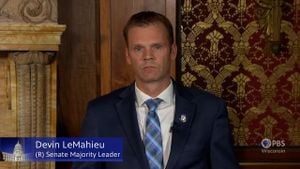Maryland’s 2024 electoral results present another strong showing for the Democratic Party, even as the national political climate shifted significantly. The election outcomes not only underscored the state’s loyal Democratic base but also marked pivotal moments, such as Angela Alsobrooks becoming the first Black woman to secure Maryland's U.S. Senate seat. This analysis delves deep, reflecting on five key takeaways from the general election results.
Maryland Holds True Blue
Maryland's status as a steadfast Democratic state continues to shine as evident from the 2024 election results. The state awarded its 10 electoral votes to Democratic nominee, Vice President Kamala Harris, who amassed nearly 1.5 million votes against Republican President-elect Donald Trump, who garnered about 920,000 votes. This outcome reflects Maryland's consistent trend of supporting the Democratic nominee for the past eight elections.
Notably, Harris won two fewer Maryland jurisdictions compared to Joe Biden’s control over 10 jurisdictions during the 2020 election but managed to capture one more than Hillary Clinton's seven jurisdictions back in 2016. Frederick County, once leaning Republican, showcased its transformation by maintaining its majority Democratic status this election season.
Conversely, two counties on the eastern shore—Kent and Talbot—switched back to Republican support, each favoring Trump by nearly 1,000 votes after being closely contested by Biden two years earlier.
Alsobrooks Wins the Senate Race
Angela Alsobrooks not only claimed victory but made history by becoming the first Black woman to serve as Maryland’s U.S. Senator. With almost 1.3 million votes, her support was substantial—a remarkable achievement shadowed by the fact she outpaced even the often-cherished moderate Republican, former Governor Larry Hogan, pulling off her win by about 200,000 votes.
Alsobrooks and Delaware's Lisa Blunt Rochester are set to make history together as the first Black women to serve concurrently in the Senate. An analysis by the Central News Service indicates strong backing from Montgomery, Prince George’s, and Baltimore counties, which collectively contributed over half of Alsobrooks’ total votes. Interestingly, the voting patterns showed divergence; many voters from Frederick and Anne Arundel counties favored Hogan, showcasing the nuanced political diversity within those regions.
House Races and Competitive Seats
The fallout within Maryland's congressional races carried certain expected outcomes, as Republican Andy Harris secured Maryland’s 1st Congressional District. The other districts called have all leaned Democratic, reflecting consistent party alignment across Maryland’s House representation—but not without tension. At the time of reporting, Maryland’s competitive 6th Congressional District race between Republican Neil Parrott and Democrat April McClain Delaney remained to be finalized; the candidates were separated by just over 300 votes, with approximately 84% of votes counted.
With substantial votes still unaccounted for from Frederick and Montgomery counties, analysts, including Matthew Klein from the Cook Political Report, speculate potential shifts toward Delaney. Klein optimistically predicts she could win by two to four points, leveraging late vote counts from these areas.
Abortion Access Enshrined
A significant message was sent concerning reproductive rights, as around one-quarter of Maryland voters supported the amendment to protect abortion rights, adding constitutional safeguards to prevent any future restrictions from infringing on access. This move positions Maryland among six states out of ten voting positively on similar abortion access measures, signaling clear public support for reproductive freedoms.
Baltimore City’s Council Measure Defeated
Local sentiments diverged on governance as Baltimore City voters rejected Question 8, which sought to reduce the size of the City Council from 12 to 8. Notably, the ballot initiative faced strong opposition, and 62% of voters opted against this Republican-backed measure. Funded by David Smith, co-owner of The Baltimore Sun, and backed by PEACE (People for Elected Accountability and Civic Engagement), the campaign failed to resonate with Baltimore’s electorate. This stands as only the second ballot initiative to be defeated by the city’s voters within the past 25 years.
Opposition from significant groups, including labor unions and the Baltimore Mayor’s office (under Mayor Brandon Scott’s leadership), played a pivotal role in galvanizing resistance against the measure, illustrating the city's prevailing preferences for city governance and representation.
All these results showcase Maryland's complex relationship with national politics, whilst reflecting local values and priorities. From historic victories to reshaping legislative landscapes, Maryland remains not just true blue, but vibrant with democratic expression.



